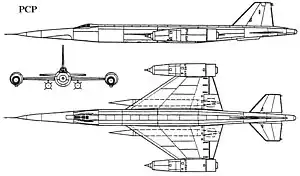Tsybin RSR
The Tsybin RSR (Reactivnyy Strategicheskiy Razvedchik, Cyrillic Реактивный Стратегический Разведчик, Russian for "jet strategic reconnaissance") was a Soviet design for an advanced, long-range, Mach 3 strategic reconnaissance aircraft.
| RSR | |
|---|---|
 | |
| Orthographically projected diagram of the Tsybin RSR | |
| Role | Reconnaissance aircraft |
| Manufacturer | Tsybin OKB-256 |
| Designer | P. V. Tsybin |
| First flight | 7 April 1959 |
| Status | Prototype/project |
| Primary user | USSR |
Development and design
In 1954, the design bureau headed by Pavel Tsybin started development of a ramjet-powered supersonic strategic bomber, the RS. This design proved impracticable, and a smaller derivative, the 2RS was proposed, which would achieve intercontinental range by being air-launched from a modified Tupolev Tu-95 bomber.[1]
This too was unsuccessful, with the aircraft unable to return to base if used on an intercontinental mission,[1] while being incapable of carrying a thermonuclear bomb.[2] The design was therefore revised again to a reconnaissance aircraft capable of operating from conventional runways, the RSR. As ramjets could not be used for take-off, they were replaced by turbofans.[1]
The RSR was primarily of aluminium construction, with a long circular-section fuselage, which housed a pressurized cabin for the pilot together with cameras and fuel, with thin, low-aspect-ratio trapezoidal wings. The engines, two Soloviev D-21 turbofans, were mounted at the tips of the wings. The aircraft had a bicycle undercarriage, with outriggers under the engine nacelles. It was planned to cruise at greater than Mach 2 at a height of 20,000 m (65,600 ft) giving a range of 3,760 km (2,340 mi).[3]
A simplified, full-sized aerodynamic prototype for the novel layout, the NM-1 was built in 1957. Intended for low-speed handling tests, the NM-1 had a steel-tube fuselage with duraluminium and plywood skinning.[4] This aircraft, powered by two Mikulin AM-5 turbojets first flew on 7 April 1959.[3] Based on the results of these trials, the RSR was redesigned (as the R-020) to make it more manoeuvrable at high altitude (it was proposed to carry out barrel rolls to avoid surface-to-air missiles).[5] More conventional Tumansky R-11 turbojets (the engine used in the MiG-21) replaced the unavailable Soloviev turbofans. Five R-020 airframes were virtually complete, only awaiting engines by April 1961, with another 10 planned, when Soviet Premier Nikita Khrushchev cancelled the program.
Specifications (R-020)
Data from Soviet X-Planes,[6] The Osprey Encyclopedia of Russian Aircraft 1875–1995[7]
General characteristics
- Crew: 1
- Length: 28 m (91 ft 10 in)
- Wingspan: 10.66 m (35 ft 0 in)
- Wing area: 64 m2 (690 sq ft) [8]
- Empty weight: 9,100 kg (20,062 lb)
- Gross weight: 19,870 kg (43,806 lb)
- Fuel capacity: 10,700 kg (23,589 lb)
- Powerplant: 2 × Tumansky R-11F turbojet engines, 38.64 kN (8,686 lbf) thrust each dry, 60.65 kN (13,635 lbf) with afterburner
Performance
- Maximum speed: 2,600 km/h (1,600 mph, 1,400 kn) at 12,000 m (39,370 ft)
- Maximum speed: Mach 2.44
- Range: 4,000 km (2,500 mi, 2,200 nmi)
- Service ceiling: 22,500 m (73,800 ft) [8]
- Take-off run: 1,200 m (3,937 ft)
- Landing run: 800 m (2,625 ft) with brake parachute
References
Notes
- Butowski 1998. p. 39–40.
- Gunston 1995, p. 376.
- Gunston 1995, p. 377.
- Air International February 1977, p. 98.
- Tsybin R-020. www.testpilot.ru. Retrieved 28 February 2008.
- Gordon, Yefim; Gunston, Bill (2000). Soviet X-Planes. Hinkley: Midland. pp. 191–192. ISBN 978-1-85780-099-9.
- Gunston 1995, p. 378.
- Tsybin NM-1. www.testpilot.ru. Retrieved 28 February 2008.
Bibliography
- Butowski, Piotr. "Steps Towards 'Blackjack': Soviet supersonic intercontinental bombers before the Tu-144". Air Enthusiast. No. 73, January - February 1998. Stamford, Lincolnshire: Key Publishing. Page 36-49. ISSN 0143-5450.
- Gunston, Bill. The Osprey Encyclopedia of Russian Aircraft 1875 - 1995. London: Osprey, 1995. ISBN 1-85532-405-9.
- "Plane Facts:Soviet strategic reconnaissance". Air International, February 1977, Vol 12 No 2. Bromley, UK:Fine Scroll. p. 98.